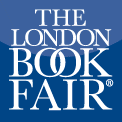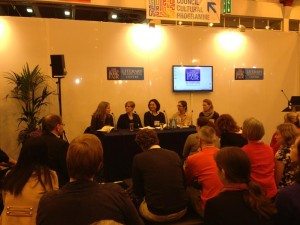 The week before last, I flew across the ocean to attend the London Book Fair as a guest of the LBF Literary Translators’ Centre (and thanks to the support of the Arts Council England). I’d never been to the LBF before and found it fascinating. It’s much smaller than the dauntingly gargantuan Frankfurt Book Fair, and the Literary Translators’ Centre – a co-production between the LBF and English PEN – was an amazing hub of activity throughout the Fair. One end of the Centre was a stage area in which panel discussions were held back to back all day (including two in which I was invited to participate: this one and this one),
The week before last, I flew across the ocean to attend the London Book Fair as a guest of the LBF Literary Translators’ Centre (and thanks to the support of the Arts Council England). I’d never been to the LBF before and found it fascinating. It’s much smaller than the dauntingly gargantuan Frankfurt Book Fair, and the Literary Translators’ Centre – a co-production between the LBF and English PEN – was an amazing hub of activity throughout the Fair. One end of the Centre was a stage area in which panel discussions were held back to back all day (including two in which I was invited to participate: this one and this one),
 |
| “A Common Language: Literary Translation in the US and the UK, with Esther Allen, Kate Griffin, Antonia Lloyd-Jones, me, and Samantha Schnee. Photo by Lawrence Schimel. |
and the other end was set up with a bunch of little tables where the translation crowd could gather to talk shop and network. The day before the fair began, representatives from translation organizations on both sides of the ocean assembled for what turned out to be a four-hour long powwow on the resources available in our respective countries; the idea was to think about ways to strengthen our transatlantic cooperation and also to learn what we can from each other to develop our individual resources on the national level. After the summit, Daniel Hahn, national programme director of the British Centre for Literary Translation, asked me to write up my impressions for publication in In Other Words, BCLT’s biannual journal. With his permission, I am posting them here as well:
What I Learned at the London Book Fair
The London Book Fair kicked off for me this year with a Translation Summit kindly hosted by the Gulbenkian Foundation and organized by the British Centre for Literary Translation (BCLT) and the UK Translators Association. I learned a lot of things there. For one, I learned to envy my U.K. colleagues their excellent network of literary translators’ organizations. Three of them in particular work together to offer translators in the U.K. many kinds of support: the Translators Association (TA, a subsidiary of the Society of Authors); the Writers in Translation programme at English PEN; and BCLT, which is based in Norwich. In the United States, we have only two major organizations: the American Literary Translators Association (ALTA) and the Translation Committee of the PEN American Center, and even taken together they have a narrower range of focus and activity than their U.K. counterparts.
Not that there aren’t also things that make my U.K. colleagues envy me. On some counts, U.S. translators are ahead. Those with established reputations can generally get their names printed on the front covers of their books and have been able to do so for at least the better part of a decade; I put this in all my U.S. contracts and rarely even have to have a conversation with my publishers about it, whereas my U.K. publishers regularly balk at this, and my U.K. colleagues report that front-cover credits for translators are rare. And grants are available in the U.S. that are designed specifically to provide direct support to translators. The National Endowment for the Arts (NEA) offers substantial fellowships in the amount of $12,500 or (in exceptional cases involving long, difficult books) $25,000, though the latter are rarely awarded; one can receive these fellowships once a decade.
There are also smaller grants that often go to emerging translators: the PEN/Heim Translation Fund Grants, available to translators working on book-length projects, whether or not they have publishers lined up, and whether or not they live in the U.S. These grants were made possible by the generosity of translator and translation advocate Michael Henry Heim, who established the Translation Fund at the PEN American Center with a large endowment nearly a decade before his death in 2012.
In addition to administering these grants, the PEN American Center offers a model contract on its website. It also awards prizes for outstanding literary translations in poetry and prose, along with a lifetime achievement award, the Ralph Manheim Medal, which is awarded once every three years.
The second major U.S. organization, ALTA, is an academic-style association that puts on a large translation conference each year unlike anything that currently exists in the U.K. and offers travel stipends to encourage beginning translators to attend the conference. It also publishes a translation studies journal, Translation Review.
Like the PEN American Center, the TA in London publishes a model contract on its website. The TA also provides a legal consultation service—translators can submit their contracts for vetting before signing them—and suggests an “observed rate” (currently £88.5/1000 words) that translators can request in payment for their work. U.S.-based organizations cannot do the same for fear of prosecution under anti-trust laws, though the “observed rate” that tends to get talked about in New York as a recommendation is $150/1000 words. But in the U.S. many translators, particularly those without established records of publication, work for far below this rate (sometimes 50% below), while in the U.K. the TA’s “observed rate” is widely adhered to, even by publishers hiring younger translators who know what to ask for. The model contracts on both sides of the pond advise translators to ask for royalties in their contracts; in the U.K. royalties for translators are pretty much universal, while in the U.S. they must be negotiated for, and some publishers categorically refuse to provide them.
English PEN—unlike the PEN American Center—is able to make grants to publishers to support the translation costs and publicity/marketing expenses for translated books. U.S. publishers have only the cultural institutes of foreign countries to turn to, which means that it is considerably more expensive to publish translations of books from countries whose governments do not offer subsidies.
One more thing I envy is the U.K.’s Emerging Translators Network, which provides encouragement, career strategizing and other sorts of peer support to younger translators who haven’t yet made names for themselves. Younger translators in the U.K. can also apply to participate in an excellent mentorship program through BCLT that pairs experienced translators with translation apprentices—many of whom have already completed a masters degree in translation—for six months of editing and career guidance. The mentors are paid for their work. What a splendid idea this is. Certainly mentorship takes place in classrooms on both sides of the ocean, but extensive individualized guidance on a long-term project is rare. In the States, I was asked to serve this year as a mentor in a program organized by the Yiddish Book Center, but that was the first I’d heard of such mentorships in the U.S. I’d love to see a support framework of this sort established over here. BCLT also hosts summer courses at the University of East Anglia.
After the Translation Summit, the American contingent was left thinking it’s time for us to establish a Translators Association of our own to provide workshop training, mentorship, publishing/promotional subsidies and direct financial assistance to a larger number of literary translators. We’ll be working on that one. Both the U.K. and the U.S. colleagues agreed that it would be good to create an international Anglophone translators association to help us pool our resources across the pond (and the Pacific too, and in India). People kept bandying about the name World Translators Federation—in large part, I’m afraid, for the sake of the acronym.
In any case, it’s clear that establishing an international umbrella organization to link together a global network of local organizations of English-language translators (including a potential new one to be set up in the U.S.) would go a long way toward ensuring that Anglophone translators around the globe will be able to profit from the resources and advances developed in each of our respective countries and network internationally. In an era of Global English, it might well be time to call instead for an era of Global Translation.

